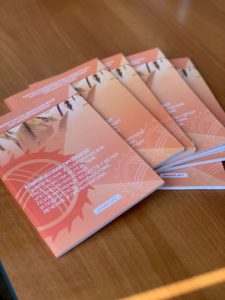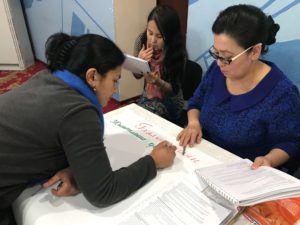 216 adolescents were registered for using psychoactive substances in 2017, according to the Narcology Center in Bishkek. Representatives of the police services in Bishkek stated that there is also a high possibility that 1,031 teenagers, who were registered for committing different offences in 2018, had an experience of using psychoactive substances or are at a high risk of starting to do so. However, this data does not show the real situation. In Kyrgyzstan, there are still no complete official data on the exact number of adolescents who use psychoactive substances.
216 adolescents were registered for using psychoactive substances in 2017, according to the Narcology Center in Bishkek. Representatives of the police services in Bishkek stated that there is also a high possibility that 1,031 teenagers, who were registered for committing different offences in 2018, had an experience of using psychoactive substances or are at a high risk of starting to do so. However, this data does not show the real situation. In Kyrgyzstan, there are still no complete official data on the exact number of adolescents who use psychoactive substances.
This is related to several factors. One of them is that the drug policy of the country is still strict and aimed to punish. Parents and children who face the problem of using psychoactive substances are afraid of getting help from medical specialists because the doctors will add teenager’s name to the special database. In the future, being in this database will not allow this teenager to be enrolled at the university or to get a high-paid job.
Another issue is that the country is lacking ways to support such adolescents. There is also a lack of a comprehensive program for the prevention of drug use among teenagers. The combination of all these factors does not allow the country’s specialists to work effectively with adolescents and to carry out preventive work.
Bridging the Gaps: health and rights of key populations (BtG) project, implemented by AFEW-Kyrgyzstan, intends to apply international experience to help adolescents who use psychoactive substances in Kyrgyzstan. BtG has regional exchange platforms, where specialists from EECA can share with each other their experience concerning harm reduction and rehabilitation issues. It helps the project to meet contemporary challenges. AFEW-Kyrgyzstan is aiming at creating a multifunctional mechanism that will help adolescents who use psychoactive substances and a professional system for preventive teenagers from using it.
The protocol is approved by the Ministry of Health
The clinical protocol ‘Mental and behavioural disorders due to the usage of new psychoactive substances among children and adolescents’ was developed with the support of AFEW-Kyrgyzstan and approved by the Ministry of Health in 2017. Professional narcologists and members of the community of people who use psychoactive drugs and other specialists developed the protocol.
“The developed clinical protocol gives the recommendations to emergency medical doctors, toxicologists, family doctors, resuscitators, psychiatrists and narcologists,” says Elmira Kaliyeva, a participant of the working group that developed the protocol.
Having developed the protocol, AFEW-Kyrgyzstan began trainings for narcologists, doctors of family medicine centres, teachers of the Kyrgyz State Medical Institute for post graduates and juvenile inspectors in Bishkek and Osh.
Working for the future
The representatives of the UN Children’s Fund (UNICEF) got interested in the protocol too and the BtG work and approached AFEW-Kyrgyzstan with a proposal to teach doctors in remote areas of Bishkek to work with this protocol. The proposal of UNICEF gave the opportunity to expand the circle of specialists familiar with the protocol. In addition, this cooperation will allow AFEW-Kyrgyzstan to be confident that all the work done in the framework of the BtG project will continue in the country for many years.
Waiting for the city hall’s help
 Establishing cooperation with government partners to ensure stable and long-term support for adolescents who use drugs was the next task of the project. In June 2018, within BtG project, AFEW-Kyrgyzstan supported a round table organized by the city administration for the presentation of the Comprehensive City Program Prevention of Juvenile Offenses for 2018-2020.
Establishing cooperation with government partners to ensure stable and long-term support for adolescents who use drugs was the next task of the project. In June 2018, within BtG project, AFEW-Kyrgyzstan supported a round table organized by the city administration for the presentation of the Comprehensive City Program Prevention of Juvenile Offenses for 2018-2020.
Deputies promised to consider the proposed Comprehensive City Program which also includes recommendations that were listed in the developed clinical protocol. The adoption of the program will allow to create a cross-sectorial system of cooperation in the country, where the various departments can work together and redirect children who use psychoactive substances to help them as efficiently as possible.
Opening a centre for teenagers
The round table also became a platform for discussing the urgent need of opening a specialized centre to support children and adolescents who use psychoactive substances.
“We are in favour of building a modern centre that is capable of providing quality support to adolescents and is able to give parents verified and necessary information. This centre will become a model for working with adolescents from a key group as well as an educational and methodological centre for social pedagogues, juvenile inspectors and psychologists,” says Natalya Shumskaya, head of AFEW-Kyrgyzstan.
Taking into consideration that Kyrgyzstan’s culture is very traditional, there is a common misconception that people who use psychoactive substances are not good members of the society. This stigma leads to several issues. For example, teenagers are scared to talk with someone about the use of psychoactive substances. They are afraid of being expelled from the school or being suspected in crimes only due to their experience of using psychoactive substances.
“The center is also going to work on increasing the level of acceptance of psychoactive substances use among the society. This will lead to more effective support from the side of adults and to less risky behavior of adolescents as they got all proper information they need. It is the first step that can lead to final abstinence,” says Chinara Imankulova, manager of BtG project in AFEW-Kyrgyzstan.
AFEW-Kyrgyzstan specialists already developed a project of such centre. The centre will also work with those who have never used psychoactive substances and with children who are in high risk of starting using them. The prevention work will include helping teenagers to organize their leisure activity and to give them information that usage of psychoactive substances is not shameful, however it is important to ask yourself whether you are aware of the risks and if you really want to do so, to find solid information and to ask for help of professionals.
Creating the centre and the approval of the Comprehensive City Program will help thousands of teenagers to make healthy choices for a happy life.



